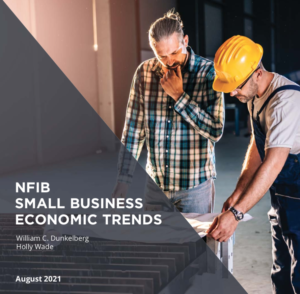Small business picture still grim during post-pandemic recovery
The plight of small businesses as the Covid era stretches past 18 months remains very much an ongoing concern. Even with all of the economic relief offered by the federal and state governments, small businesses are still facing considerable headwinds.
The latest Small Business Optimism Index from the National Federation of Independent Business (NFIB) actually found small-business owners feeling a bit sunnier: The August index saw a 0.4% increase in optimism. However, its NFIB Uncertainty Index decreased 7 points to 69 ”” the lowest level since January 2016, and a disheartening sign that small-business owners”™ anxiety is on the rise.

“The most telling part of this survey is the level of uncertainty that our small-business owners are feeling right now,” affirmed Andrew Markowski, NFIB state director in Connecticut.
“It”™s been a year and a half since the pandemic hit and the numbers from our surveys show that as time marches on, our members are not getting any more confident that they can get out of this epidemic unscathed.
“Many have had to close their doors,” he said. “Many more are saying if this continues, they too will fall victim to a volatile business environment and government mandates.”
Among the NFIB”™s findings:
Owners expecting better business conditions over the next six months decreased by 8 points to a net negative 28%. That represents a decline of 16 points over the past two months, to the lowest reading since January 2013.
50% of owners reported job openings that could not be filled, an increase of 1 point from July and a 48-year record high for the second consecutive month.
The number of unfilled job openings remains far above the 48-year historical average of 22%.
A net 0% of all owners (seasonally adjusted) reported higher nominal sales in the past three months, down 5 points from July. The net percent of owners expecting higher real sales volumes improved 2 points to a net negative 2%.
A net 11% of owners viewed current inventory stocks as “too low” in August, down 1 point from July”™s record high. A net 11% of owners plan inventory investment in the coming months, up 5 points from July.
Meanwhile, the latest from Goldman Sachs “10,000 Small Businesses Voices” survey found that 44% of small-business owners have less than three months”™ cash reserves ”” a particularly worrisome situation should another Covid-related shutdown or other emergency arise. Most financial experts recommend at least three to six months.
“And that”™s not all,” said Lauren Anstey, a vice president in the Office of Government Affairs at Goldman Sachs. “It”™s even higher for black-owned small businesses ”” 51% ”” and while 31% of white small businesses say they”™re very confident about getting access to funding, only 20% of black-owned businesses say the same thing.”
Small businesses are also concerned by the level of debt they have taken on as they work toward full recovery, with 41% of white-owned businesses and 55% of black-owned businesses expressing concern that the amount of debt accumulated prior to or during the pandemic will hurt their ability to return to normal.
Although the survey does not look specifically at women-owned small businesses or those owned by other minorities, Anstey said that significant disparities between those groups and white male-owned businesses were likely. “Obviously we”™d like to see those gaps closed,” she said.
“The American Rescue Plan delivered $350 billion to state, local, county, city and tribal governments,” Anstey said. “And you had the PPP, which was extremely helpful, and other relief for businesses. But more direct aid to small businesses is still needed.”
Indeed, “10,000 Small Business Voices” found that 92% of small-business owners saying that it is important for the Biden administration to prioritize policies that level the playing field for small businesses.
In addition, 96% said state and local governments should prioritize federal Covid-19 relief funds to provide small businesses access to capital and 83% expressed support for President Joe Biden”™s July 9 Executive Order directing the federal government to promote greater procurement competition and increase opportunities for small businesses.
“Establishing a permanent commercial loan program for qualifying small businesses would be extremely helpful,” Anstey said.
“Eighteen months of Covid-related economic headwinds have battered America”™s small businesses,” added Joe Wall, managing director, government affairs at Goldman Sachs. “While many storefronts are reopening, small-business owners from across the country are sending a clear message that they need more relief in order to continue on their road to recovery.”
Anstey said Goldman Sachs continues to press federal lawmakers to take action, noting that Connecticut Congressman Jim Himes recently visited two Greenwich businesses ”” gift shop Splurge and interior design firm Tiger Lily”™s ”” at Goldman”™s behest.
She noted that the company continues to work with federal lawmakers on a nonpartisan basis and that most are amenable to visiting their constituents to learn about their plights.
“Almost half of U.S. employees work for the small businesses that are vital to our economy and communities,” Himes said in a statement following his visit. “All small businesses, especially those owned by women and minorities, need increased access to capital, critical resources to navigate the pandemic and crucial mental health and child care services.”
“All we ask is that Congress continues to be there for us,” added Splurge owner Sonia Malloy.